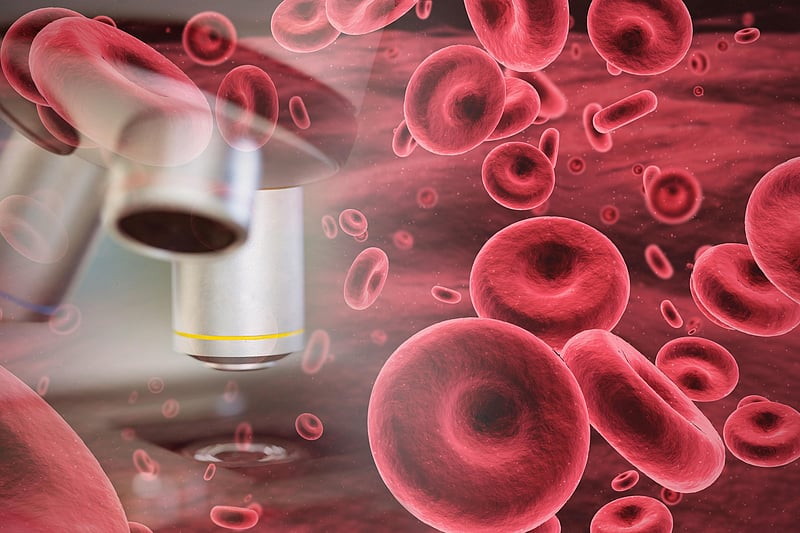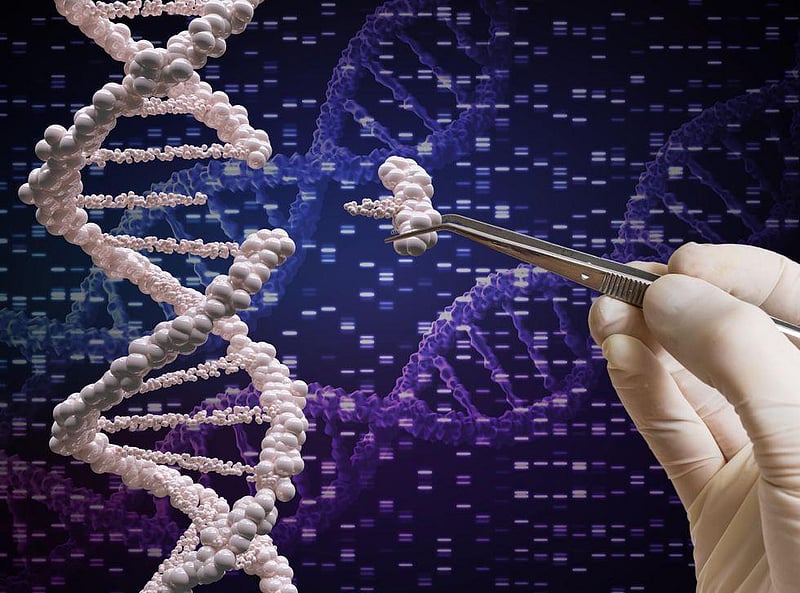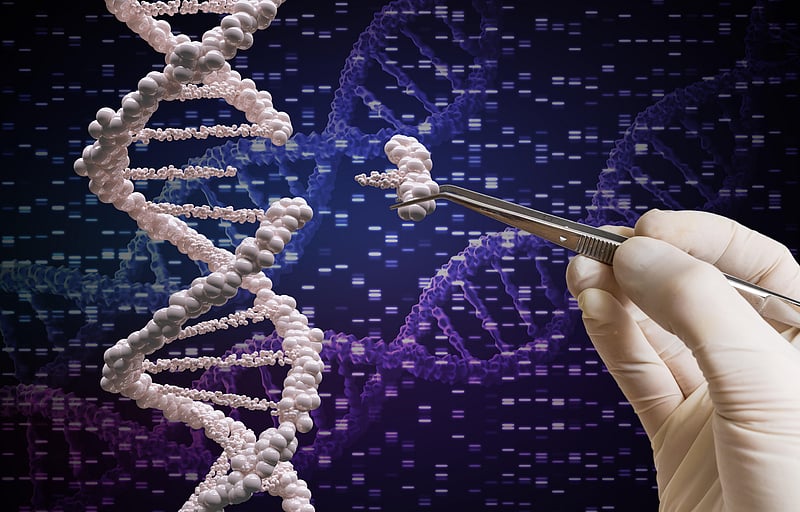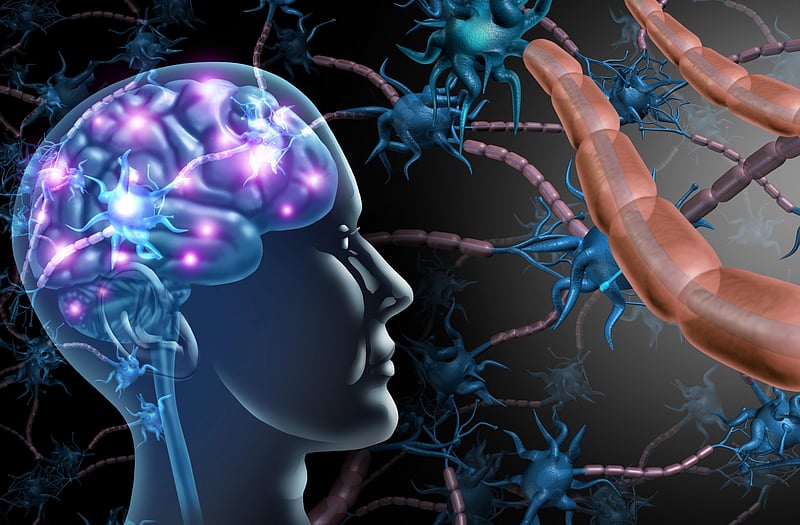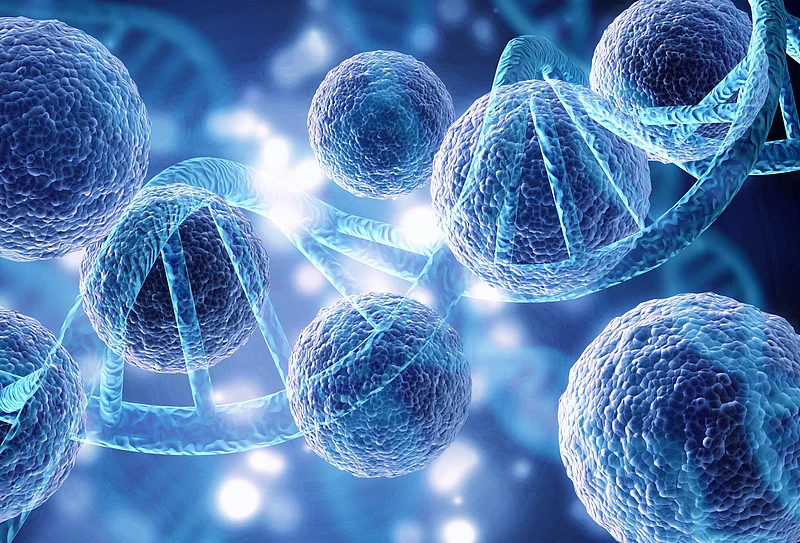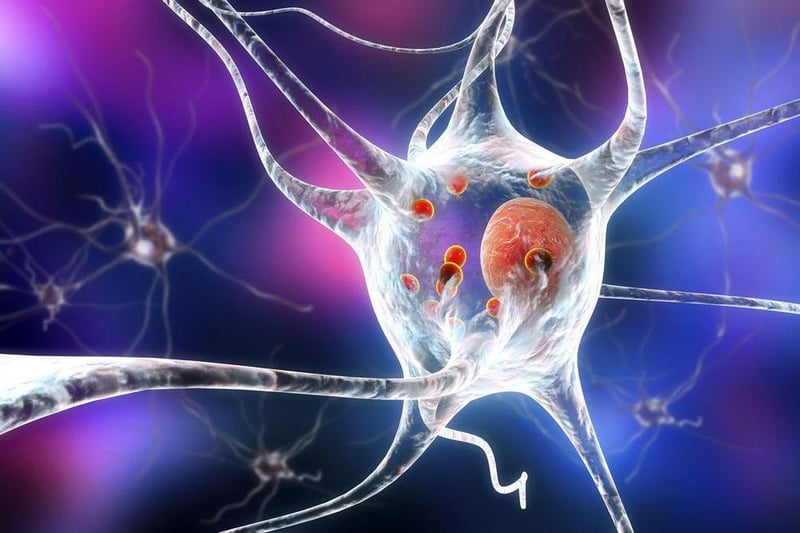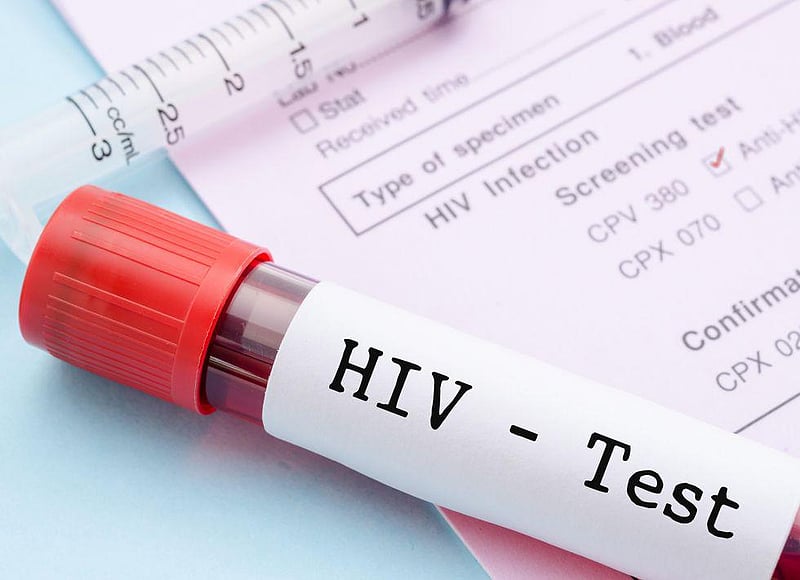Get Healthy!
200 Results for search "Genetics".
Health News Results - 200
For the past couple of centuries, humans have been breeding dogs to meet specific physical characteristics - to make Golden Retrievers fluffy, to make Rottweilers muscular, or to make Chihuahuas tiny.
Dog enthusiasts...
- HealthDay Reporter
- Dennis Thompson
- |
- April 29, 2022
- |
- Full Page
Genetic mutations build up faster in the brain cells of Alzheimer's disease patients than in other people, new research reveals.
The discovery could point the way to new Alzheimer's treatments.
DNA errors called
Cancer patients' blood type may play a role in their risk for dangerous blood clots, researchers say.
Cancer and its treatments increase the risk for venous thromboembolism (VTE). That includes de...
- HealthDay Reporter
- Robert Preidt
- |
- April 15, 2022
- |
- Full Page
Strong natural protection against cancer-causing mutations may explain why some longtime smokers don't develop lung cancer, according to a new study.
Researchers compared mutations in cells lining the lungs from 14 never-smokers, ages 11 to 86, and 19 smokers, ages 44 to 81. The smokers had used tobacco up to 116 pack years. One pack year equals 1 pack of cigarettes smoked every day for a...
- HealthDay Reporter
- Robert Preidt
- |
- April 13, 2022
- |
- Full Page
Researchers who identified 120 genes linked to schizophrenia say their findings are the strongest ever demonstrating the genetic basis of the psychiatric disorder and could lead to new treatments.
"Previous research has shown associations between schizophrenia and many anonymous DNA sequences, but rarely has it been possible to link the findings to specific genes," said co-lead author Mic...
- HealthDay Reporter
- Robert Preidt
- |
- April 7, 2022
- |
- Full Page
The Human Genome Project produced the most complete map of human genetics ever assembled in 2003 - but that map still held many uncharted territories.
It did not contain about 8% of the human genome, representing crucial regions and large gaps that have remained hidden from scientists.
Now, an ambitious team of researchers has gone back and filled those empty spaces, assembling the ...
- HealthDay Reporter
- Dennis Thompson
- |
- March 31, 2022
- |
- Full Page
An experimental cream-based gene therapy may soon become the first U.S. government-approved means for treating a rare and devastating skin disease that produces "butterfly children."
Patients with recessive dystrophic epidermolysis bullosa (EB) are called butterfly children "because their skin...
- HealthDay Reporter
- Dennis Thompson
- |
- March 29, 2022
- |
- Full Page
German shepherds are one of the most noble dog breeds on the planet, but they can fall prey to an often deadly swallowing disorder.
Now, researchers report they have not only identified a gene variant that explains this susceptibility, but they have also designed a test to spot the disease --
Scientists have developed a single test that can rapidly detect a collection of rare genetic diseases -- an advance they hope will shorten the "diagnostic odyssey" that people with these conditions can face.
The test diagnoses conditions known collectively as "STR-expansion" disorders, which include more than 50 genetic diseases that affect the brain, nervous system and muscles.
Som...
- HealthDay Reporter
- |
- March 10, 2022
- |
- Full Page
Two groups of indigenous people in the Bolivian Amazon have some of the world's lowest dementia rates, and that may offer insight on how to prevent Alzheimer's disease, a new study suggests.
Researchers found only about 1% of older Tsimane and Moseten people have dementia, compared with 11% of people 65 and older ...
- HealthDay Reporter
- |
- March 10, 2022
- |
- Full Page
The U.S. Food and Drug Administration on Monday gave the green light to the sale of beef from gene-edited cattle.
"Today's decision underscores our commitment to using a risk and science-based, data-driven process that focuses on safety to the animals containing intentional genomic alterations and safety to the people who eat the food produced by these animals," Dr. Steven M. Solomon, dir...
- HealthDay Reporter
- |
- March 8, 2022
- |
- Full Page
Who hasn't had the urge to trace their roots by buying consumer genetic testing kits? But in a new report, researchers warn that you may come across some unexpected, and potentially troubling, information if you discover relatives this way.
"If you're going to participate in one of these services, you should be ready to learn something about your family that you weren't necessarily expect...
- HealthDay Reporter
- |
- February 28, 2022
- |
- Full Page
A massive genetic family tree traces the ancestry of all people today.
The researchers who created it said it shows how individuals worldwide are related to one another and reveals key events in
Joshua Akey admits he didn't care much for dogs in his youth.
"My wife, who grew up with dogs, convinced me that we should get a dog our first year in graduate school. I very begrudgingly agreed, and have been a dog person ever since," said Akey, a professor with Princeton University's Lewis-Sigler Institute for Integrative Genomics.
Akey's turnaround as a dog lover is impressive be...
- HealthDay Reporter
- |
- February 21, 2022
- |
- Full Page
Omicron COVID-19 patients are younger and have more breakthrough infections, a new study finds. But people infected with Omicron are also less likely to be hospitalized or need intensive respiratory support than those who'd gotten the earlier Alpha and Delta variants.
The researchers examined data on patients at Houston Methodist hospital, where by the start of 2022,
It's less enchanting than reading tea leaves, but federal health officials announced Friday that they are expanding nationwide efforts to track COVID-19 by monitoring virus levels found in raw sewage.
The U.S. Centers for Disease Control and Prevention expects to add an additional 250 surveillance sites over the next few weeks to a list of more than 400 places that already regularly test ...
- HealthDay Reporter
- Dennis Thompson
- |
- February 4, 2022
- |
- Full Page
Your sense of smell may not be as good as that of your ancestors.
A new study that tested volunteers' perceptions of various smells -- including underarm odor -- adds to growing evidence that people's sense of smell is declining, little by little.
"Genome-wide scans identified novel genetic variants assoc...
- HealthDay Reporter
- Robert Preidt
- |
- February 4, 2022
- |
- Full Page
Four in 10 Americans say they've had at least one heart-related issue during the COVID-19 pandemic, and about one in four who have tested positive say COVID has affected their heart health, according to a new online poll.
Shortness of breath (18%), dizziness (15%), higher blood pressure (15%) and chest pain (13%) were the top problems reported in the survey of 1,000 American adults.
<...- HealthDay Reporter
- Robert Preidt
- |
- February 2, 2022
- |
- Full Page
Most gene variants that have been labeled "pathogenic" may make only a small difference in a person's risk of actually developing disease, a new study suggests.
- HealthDay Reporter
- Amy Norton
- |
- January 27, 2022
- |
- Full Page
A one-two punch from science has clearly tagged the mononucleosis virus, Epstein-Barr, as a major cause of multiple sclerosis.
The Epstein-Barr virus (EBV) appears to trigger multiple sclerosis (MS) by tricking the immune systems of some into attacking their body's own nerve cells, a new study indicates.
"...
- HealthDay Reporter
- Dennis Thompson
- |
- January 26, 2022
- |
- Full Page
Tobacco use is far and away the leading cause of lung cancer, but non-smokers are also at risk, experts say.
People who smoke have the highest risk, and smokeless tobacco is also a threat. About 90% of lung cancer cases could be prevented by eliminating tobacco use, according to the World Health Organization...
- HealthDay Reporter
- |
- January 22, 2022
- |
- Full Page
Your fingerprints may be more than a surefire way to identify you: New research suggests their patterns may be linked to genes that guide limb development.
"People may wonder why our team is working on fingerprints," said co-senior study author Sijia Wang, a geneticist at the Shanghai Institute of Nutrition and Health in China. "We started the work purely out of curiosity. But later it tu...
- HealthDay Reporter
- Cara Murez
- |
- January 12, 2022
- |
- Full Page
A certain gene mutation known as APOE4 has long been known to raise the risk for Alzheimer's disease.
Now, researchers report it may also predispose people to increased susceptibility to COVID-19 infection and severe symptoms, including small brain bleeds.
Researchers in Finland, where about ...
- HealthDay Reporter
- |
- December 31, 2021
- |
- Full Page
If you like your coffee black, it could be that your grandpa or your great-aunt did, too.
A preference for black coffee and also for dark chocolate seems to lie in a person's genes, scientists report.
It's not the taste that these individuals actually love, but it's because their genes enable them to metabolize
Researchers say they may be closer than ever to detecting ovarian cancer earlier and improving the odds for women with this life-threatening disease.
In a new study, scientists used stem cells created from the blood samples of women with BRCA mutations and ovarian cancer to fashion a model of fallopian tube tissue.
There, they found first hints of ovarian cancer in the fallopian tu...
- HealthDay Reporter
- Cara Murez
- |
- December 29, 2021
- |
- Full Page
Every year in the United States, a few hundred children die suddenly and without explanation. Now researchers have found gene variants that may contribute to some of those tragic deaths.
The hope, experts said, is that understanding the underlying mechanisms will eventually lead to ways to save lives.
Since the 1990s, the term
Genes in human embryos become active far sooner than once thought, according to a study that provides fresh insight into development.
Contrary to the old view that gene activity begins two to three days after conception when the embryo is made up of four to eight cells, researchers found that it actually begi...
- HealthDay Reporter
- Robert Preidt
- |
- December 27, 2021
- |
- Full Page
French Bulldogs are incredibly cute, sporting adorable snub snouts, big round heads, bright wide eyes and large bat ears.
Unfortunately, the physical traits that make them one of the most popular breeds in the United States and United Kingdom also saddle them with a host of health problems, a new study shows.
Frenchies have significantly higher odds than other dog breeds of being di...
- HealthDay Reporter
- Dennis Thompson
- |
- December 20, 2021
- |
- Full Page
Have you just turned 60 and feel like you're in great health?
Well, new research suggests that unseen dangers lurk: Scientists found that cancer-free people older than 60 have at least 100 billion cells with at least one cancer-associated mutation.
But there's good news, too: The vast majority of these mutations won't do anything and most people (60%) will go their entire lives wit...
- HealthDay Reporter
- Robert Preidt
- |
- December 16, 2021
- |
- Full Page
For certain leukemia patients, some welcome findings: New research confirms long remissions after treatment with the drug ibrutinib and chemotherapy.
The study involved 85 patients with chronic lymphocytic leukemia (CLL). All were 65 or younger, and 46 had more aggressive, unmutated IGHV subtype of the d...
- HealthDay Reporter
- Robert Preidt
- |
- December 14, 2021
- |
- Full Page
Children at risk for multiple sclerosis (MS) might find some protection from the disease by spending more time in the sun, a small study suggests.
Although MS is rare in children and young adults, those with relatives who have the condition have increased odds of developing the disease early. Exposure to sunlight may cut their risk in half, researchers say.
"In families where there'...
- HealthDay Reporter
- Steven Reinberg
- |
- December 9, 2021
- |
- Full Page
Traits particular to certain dog breeds -- the distinctive spots of a dalmatian or the stubby legs of a dachshund -- are often achieved through inbreeding.
But most breeds are now highly inbred, increasing a dog's risk of health problems, a new study confirms.
"It's amazing how inbreeding seems to matter to health," study leader Danika Bannasch said.
Her genetic analysis of 2...
- HealthDay Reporter
- Robert Preidt
- |
- December 7, 2021
- |
- Full Page
Genetic testing can help guide management and treatment of unexplained epilepsy in children, new research suggests.
"A genetic diagnosis impacted medical management for nearly three out of four children in our study," said study author Dr. Isabel Haviland. She's a postdoctoral research fellow in neurology/neurobiology at Boston Children's Hospital and Harvard Medical School.
In the ...
- HealthDay Reporter
- Robert Preidt
- |
- December 7, 2021
- |
- Full Page
A rare gene variant discovered among Amish people may help lower "bad" cholesterol and protect against heart disease, a new study suggests.
Researchers found that among nearly 7,000 Amish people, the gene variant was tied to reductions in both LDL cholesterol and fibrinogen -- a protein that is a marker of inflammation and linked to heart disease risk.
There was also evidence of pro...
- HealthDay Reporter
- Amy Norton
- |
- December 3, 2021
- |
- Full Page
A boy or a girl? New research suggests that the air pregnant women breathe or the water they drink could play a role in their baby's sex.
The finding stems from tracking hundreds of factors -- including pollution exposure -- surrounding the birth of more than 6 million Americans an...
- HealthDay Reporter
- Alan Mozes
- |
- December 3, 2021
- |
- Full Page
A defect in the blood-brain barrier may play a role in Parkinson's disease, a groundbreaking research study suggests.
The blood-brain barrier acts as a filter to keep out toxins while still allowing the passage of nutrients to nourish the brain. This study found that in some people with Parkinson's, the b...
- HealthDay Reporter
- Robert Preidt
- |
- November 29, 2021
- |
- Full Page
Researchers have identified a second HIV-positive person whose body might have naturally cleared the infection -- sparking hope that studying such exceedingly rare events will help lead to a cure.
The researchers cautioned that they cannot prove the woman has fully eradicated the virus from her body, in what's known as a "sterilizing" cure.
But in exhaustive tests of over 1.5 billio...
- HealthDay Reporter
- Amy Norton
- |
- November 16, 2021
- |
- Full Page
Whole genome sequencing of blood samples improves detection of rare genetic conditions called mitochondrial disorders, British researchers report.
These disorders are inherited and affect about 1 in 4,300 people, causing progressive, incurable diseases.
Though they are among the most common inherited disorders, mitochondrial disorders are tough to diagnose because they can affect ma...
- HealthDay Reporter
- Robert Preidt
- |
- November 8, 2021
- |
- Full Page
Researchers may have unearthed a surprising risk factor for often-fatal brain bleeds: Sleepless nights.
In a study of about 70,000 adults, researchers found that people with a genetic predisposition to insomnia were at somewhat higher risk of a brain aneurysm. An aneurysm is a weak spot in an artery wall that bulges out and fills with blood. In some cases, it can rupture and cause life-th...
- HealthDay Reporter
- Amy Norton
- |
- November 3, 2021
- |
- Full Page
New research in mice may provide clues to age-related hair loss in men and women.
Scientists found that as hair stem cells in mice age, they lose the stickiness that keeps them secured inside the hair follicle. This allows the stem cells to drift away from the follicle.
"The result is fewer and fewer stem cells in the hair follicle to produce hair," said study lead author Rui Yi, a ...
- HealthDay Reporter
- Robert Preidt
- |
- October 28, 2021
- |
- Full Page
Artificial intelligence (AI) might be able to spot the next virus to jump from animals to humans, Scottish researchers report.
Identifying diseases before they become a threat to humans is challenging, because only a few of the nearly 2 million animal viruses can infect humans. By developing machine learning models, researchers can analyze genetic patterns of viruses that might infect peo...
- HealthDay Reporter
- Steven Reinberg
- |
- September 30, 2021
- |
- Full Page
Parents and their children often share numerous traits -- including a dislike for broccoli and other veggies in the same family.
Noxious enzymes from bacteria in saliva may be the reason why, a new study suggests.
Levels of these compounds are similar in parents and children, which might be why these vegetables are turnoffs for both generations, especially when the levels are h...
- HealthDay Reporter
- Steven Reinberg
- |
- September 23, 2021
- |
- Full Page
Cholesterol made in the brain may spur development of Alzheimer's disease, a new study suggests.
Cholesterol made by cells called astrocytes is needed for controlling production of amyloid beta, a sticky protein that builds up in the brain and accumulates into the plaques that are the tell-tale sign of Alzheimer's.
Researchers say these new findings may offer insight into how and wh...
- HealthDay Reporter
- Steven Reinberg
- |
- September 17, 2021
- |
- Full Page
Even when genetics and personality are working against you, having a strong network of supportive friends and family may help lower alcoholism risk, researchers say.
"Genes play an important role in alcohol use," stressed Jinni Su, an assistant professor of psychology at Arizona State University in Tempe, and lead author of a new study.
But "genes are not our destiny," she added.
- HealthDay Reporter
- Alan Mozes
- |
- September 16, 2021
- |
- Full Page
Attention-deficit/hyperactivity disorder (ADHD) appears to be somehow linked to risk of dementia and Alzheimer's disease, a new multigenerational study has found.
Parents and grandparents of people with ADHD have a higher risk of Alzheimer's and dementia than people with no ADHD in their family, Swedish researchers said.
Specifically, parents of an ADHD child have a 34% higher risk ...
- HealthDay Reporter
- Dennis Thompson
- |
- September 14, 2021
- |
- Full Page
Your favorite tabby cat may seem to have little similarity to her relatives in the wild, but all share a key gene that gives them their distinctive look.
Why cats' coats are decorated with stripes, spots and blotches has long been a mystery. Now, researchers have identified a specific gene that all domestic cats, wild big cat species and possibly even other mammals have that regulates dev...
- HealthDay Reporter
- Cara Murez
- |
- September 14, 2021
- |
- Full Page
Most parents want their children to live carefree lives, so a diagnosis of childhood cancer is devastating. Fortunately, pediatric cancers are rare.
Yet it doesn't hurt to be watchful for the warning signs, suggest experts in childhood cancer from Penn State Health.
The best screening most parents can do is to stay on track with well-child visits, the doctors said.
"For e...
- HealthDay Reporter
- |
- September 11, 2021
- |
- Full Page
Danish researchers have found genetic causes for epilepsy in half of children they studied and said half of those could be treated with targeted therapies.
That's the upshot of genetic testing of 290 children born between 2006 and 2011. Some had been diagnosed with epilepsy. Others had had seizures along with a high temperature; they were either long seizures or consciousness was not rega...
- HealthDay Reporter
- |
- September 6, 2021
- |
- Full Page
A new coronavirus variant called Mu that may be able to evade existing antibodies, including those from vaccines, is under close watch by U.S. health officials.
The variant hasn't taken extensive hold in the United States at this point, but the U.S. National Institute of Allergy and Infectious Diseases is taking it "very seriously," according to its director, Dr. Anthony Fauci, CBS Ne...
- HealthDay Reporter
- Robert Preidt
- |
- September 3, 2021
- |
- Full Page
Schizophrenia is a debilitating disease that can make navigating daily life a massive challenge, but a new blood test could flag it in its early stages, researchers say.
Their analysis of blood samples identified epigenetic markers -- part of your DNA -- that differ between people with schizophrenia and those without the mental health disorder.
The researchers developed a model to a...
- HealthDay Reporter
- Robert Preidt
- |
- August 12, 2021
- |
- Full Page



